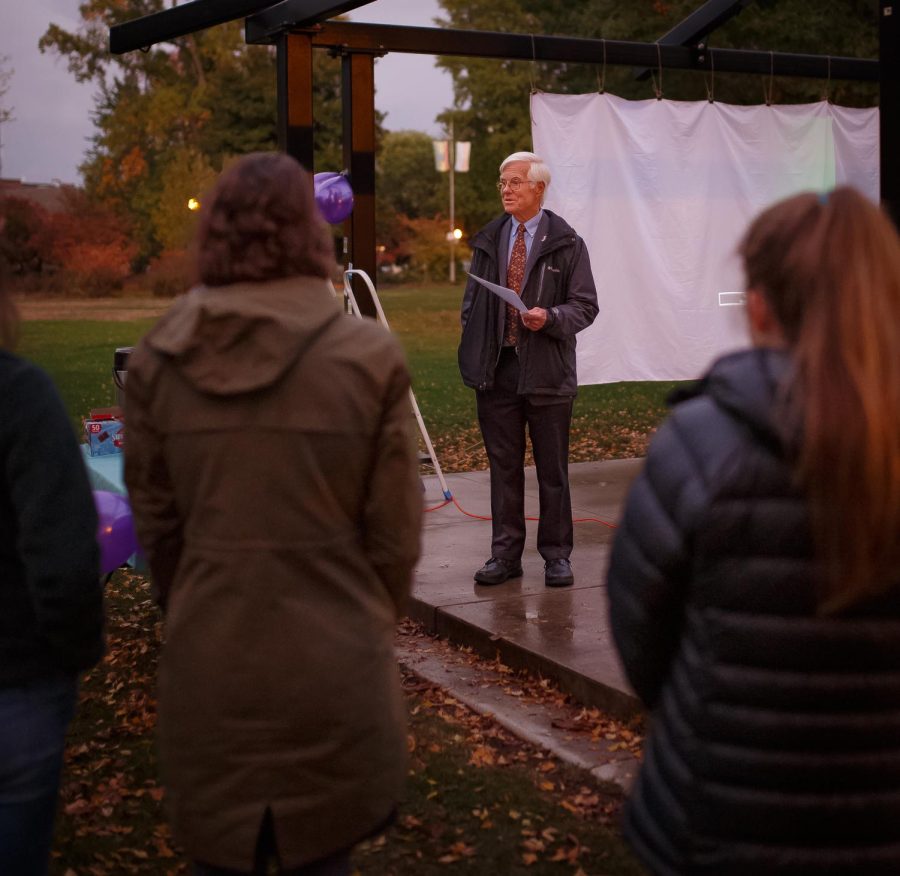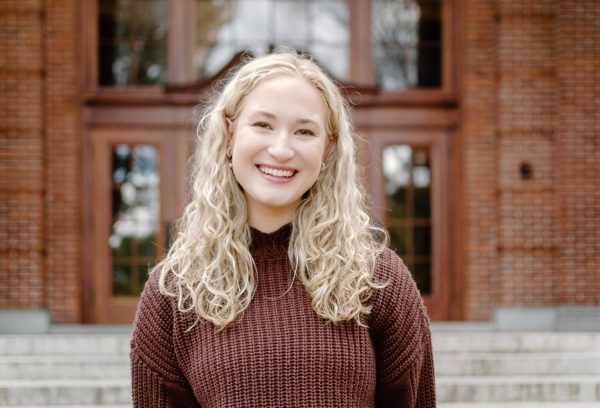CARDV holds vigil for domestic violence awareness month
Current Corvallis mayor Biff Traber gives a speech at the CARDV vigil, Oct. 24. The vigil aimed to shed light on domestic violence and rape in addition to sharing ways to help.
November 4, 2022
“Domestic Violence hotlines across the country receive over 200,000 calls every single day from survivors and the people who are close to them, looking for support and services.”
In a sea of purple decorations, the Center Against Rape and Domestic Violence held a vigil on Oct. 24 at the Corvallis Central Park Gazebo to support victims and survivors of sexual assault.
Corvallis Mayor Biff Traber was invited to speak and videos of survivors sharing their stories were played for approximately 20 individuals who attended the vigil.
CARDV is an organization that supports victims of sexual assault with a 24-hour hotline that has existed for 41 years. They stand by the sides of victims as they go to law enforcement, receive evidence kits, or visit the emergency room after being assaulted.
Members of Oregon State University’s Center for Advocacy, Prevention and Education helped with the event. CAPE aids OSU students to eliminate gender based violence and provides survivor support.
“Domestic violence is still a very prevalent issue. We see it more because we’re more aware of it, but the statistics haven’t quite gone down as we would have hoped that they have,” said Nuria Gamarra, education and outreach manager at CARDV.
The vigil aimed to bring attention to rape and domestic violence and shared ways in which community members can help aid victims.
“In the United States, about one in four women and one in nine men have experienced severe physical, emotional or sexual abuse from a partner. Here in Oregon, the number for women is actually higher. It’s one in three. We have one of the higher rates of domestic violence in the country, ” said Jacob Stewart, community educator at CARDV.
According to Gamarra, CARDV is working towards prevention, not just awareness. CARDV visits schools in both Linn and Benton counties to teach youth about domestic violence, stopping the issue at its roots.
Stewart said the courses cover topics such as consent, sexual assault, physical abuse, dating, violence and more. Its goal is to teach students what an abusive relationship resembles in real life.
“Anybody can be a survivor. But the vast majority of survivors that we serve are women, and the vast majority of their abusers are men. So clearly, there’s something about the way that young men and boys are being raised here that leads them to think that that sort of behavior is acceptable when it’s not,” Stewart said.
This is why Stewart is restarting CARDV’s Men’s Coalition, a group focused on finding ways in which men can help end domestic violence. It’s a monthly meeting where individuals of any gender can join together and discuss healthy masculinity and ways to get involved in the community.
“How do we fix a society where these sorts of unbalanced, poisonous, broken relationships can exist?” Traber said.
According to Traber, in 2018 there were a total of 130,000 calls for help in Oregon, 80,000 of which didn’t receive support because there weren’t enough resources.
“I thought of it as a sort of silent problem that goes on behind closed doors, in relationships, it sometimes hits the news, and we’re talking about power relationships and violence of different types,” said Biff Traber, Mayor of Corvallis.
The vigil ended with words from Stewart after videos of survivor’s stories who said CARDV helped their families escape domestic violence.
“You probably know a survivor. You can listen to them and support them. Believe them when they tell you about their experiences and work in your community to end violence. And remember our hotline is always open if you or somebody who you know wants to connect with us,” Stewart said.












































































































